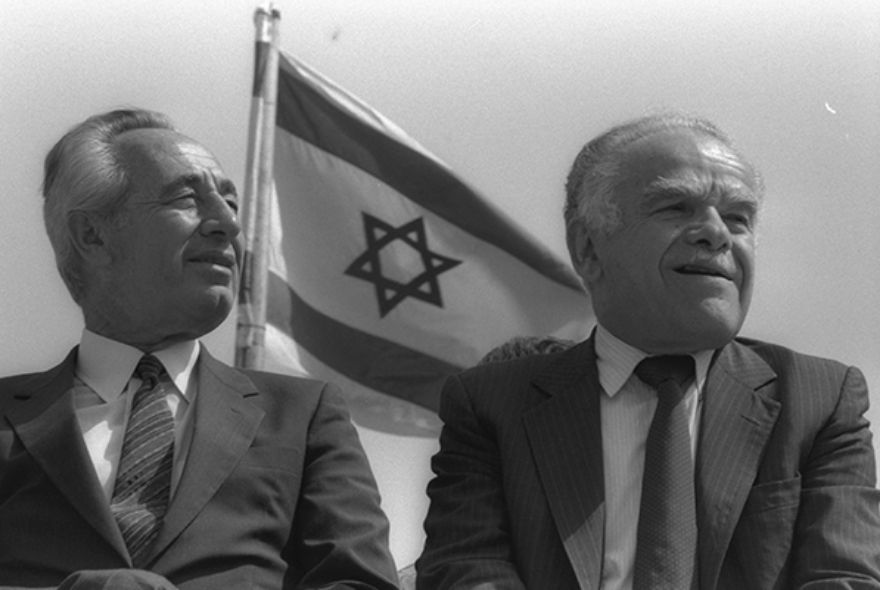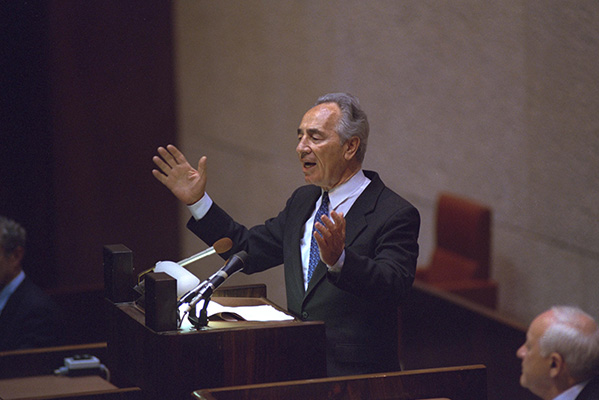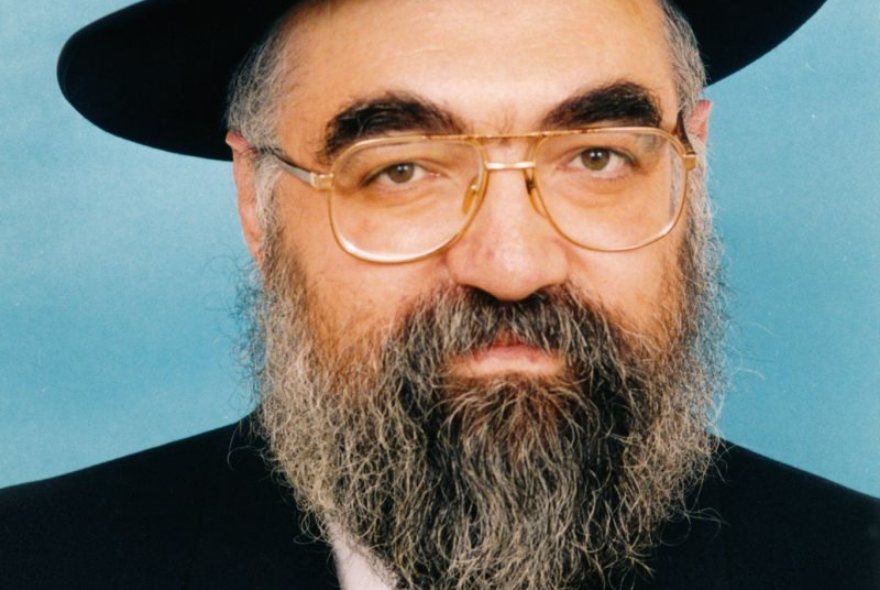
The beginning of Chabad's encounter with Israeli politics occurred on one of the days of Adar-Shani 5789, when the CEO of the umbrella organization of Chabad institutions, Rabbi Aryeh Leib Kaplan, received a request from the Ministry of Finance, stating that senior officials in the ministry were requesting to meet with Chabad officials, in order to examine the possibility of direct funding for Chabad institutions and houses in Israel.
Rabbi Kaplan is quick to report this to the Rebbe: "There have been contacts with officials in the Ministry of Finance about direct funding for Chabad houses. And because Peres is looking to get closer, etc., there is a chance that it will come to fruition."
His question was whether to accept their request and come to the meeting? And the Rebbe's answer was not shy: "We will accept. I will mention the score."
For the activists, it was clear that this gave them the 'green light' and they could schedule a meeting.
At this stage, Rabbi Blau describes in detail the contacts with Peres and his people, the meetings that took place in secret, as well as the reports that were sent to the Rebbe and his responses.
'day The sixth reveals
At that time, a newspaper called 'Yom Hashishi' was published in Israel. It was a religious weekly, the first to characterize itself as 'independent' - unlike other religious and Haredi media outlets and newspapers, which were published on behalf of various parties and organizations (such as 'Hamodiya' - under the auspices of Agudat Israel; 'Yated Ne'eman' under the auspices of Degel Hatorah, 'Hatzofe' under the auspices of the National Religious Party and 'Sha'arim' under the auspices of PAI).
The newspaper was considered, at least in those days, to have a left-wing orientation.
'Yom Hashishi' preached for rapprochement between the ultra-Orthodox public and the Israeli left, and within the framework of this agenda, it not only gave a sympathetic platform to the voices of religious elements interested in a change of government in favor of the 'alignment'; 'Yom Hashishi' was also the only religious newspaper that devoutly reviewed the failure to implement the sweeping coalition agreements signed between Agudat Israel and the Likud, centered, of course, on the dramatic promise to amend the 'Who is a Jew' law.
From the day the unity government was formed, the newspaper's pages ran a countdown to the date when the agreement stipulated that the law would be amended. And when the date arrived and the agreement was not fulfilled, Shamir brazenly turned his back on the Agudat Yisrael Knesset members - and the newspaper, of course, covered it with emphasis and great pleasure.
For example, I remember how the chairman of the Agudat Yisrael faction and chairman of the Finance Committee at the time, the late MK Rabbi Moshe Ze'ev Feldman - for whom this was his first year in the Knesset (he was 'borrowed' from the leadership of the Imrei Emet Yeshiva), was unable to hide his astonishment at Shamir's sweeping and public denial of the promises he had made.
At one of the coalition management meetings, when Shamir finished his remarks, Rabbi Feldman scornfully blurted out: "Like you keep the promises you made to us?" And Shamir, usually reserved, angrily defied Rabbi Feldman's eyes, which were wide with astonishment: "This is politics, and you are a student of it."
And back to our subject: Of course, from the moment rumors began circulating in political corridors about contacts between Chabad and the 'Ma'are', the newspaper echoed this and sought every way to intensify the matter and turn it into a kosher certificate for a reconnection between the Haredi public and the Israeli left.
Things reached their peak when the newspaper photographer managed to document at the entrance to the Plaza Hotel (later the Sheraton Plaza and now the Leonardo) on King George Street in Jerusalem, inside a vague sign in English - detailing the activity taking place on the hotel's floors at those hours - a small headline announcing the existence of a meeting between Chabad and the "Arrangement", in one of the hotel's locations.
This was, of course, a meeting that was decided to take place in a private suite for fear of press scrutiny and biased and damaging commentary. The photographer, Ephraim Kilstock, immediately realized that at that moment a first-rate journalist had boarded the 'Scoop' and equally knew that he would not be able to innocently board and document the meeting itself. He therefore awaited a long hour quietly near the elevator door, anxiously awaiting the moment when he would be able to document the meeting as they left the meeting.
The prey soon fell into the hunters' net: Readers of "Yom Heishishi" were astonished, as was the generality of Haredi Judaism, to discover on the front page of the newspaper a clear image that was not ambiguous. The image showed an open elevator in a hotel, through which emerged - with frightened eyes that betrayed the surprise that awaited them when they noticed the flash of the camera in front of them - Rabbi Tuvia Blau and Rabbi Chaim-Yehuda Rabinowitz.

This image provided absolute confirmation of the existence of contacts between Chabad and the 'Ma'arach', which from that moment on were no longer a secret or a rumor that was persistently reported by 'Yom Shishyi', but a fait accompli that existed and was created and cannot be denied.
Persia And Beilein In the USSR with Chabad
Despite the storm that arose after the revelation of the "secret" meeting between the Chabad organization and businessmen, the parties continued to maintain contact - and, most importantly, to plan the details of Shimon Peres' expected visit to the strongholds of Chabad activity in Russia, a proposal that was made in the late summer of 1989 and received a positive response from the Rebbe, with the arrow marking the box "It is correct" and the Rebbe adding: "I will mention the score."
The point was that during his expected visit to post-communist Russia, Peres would also visit the centers of Chabad activity - the kind that was hidden and underground throughout the years of communism and now, with the fall of the Soviet regime, has become increasingly visible and vibrant.
Again, four months pass and we find on the 17th of Adar 5759 another report in which Rabbi Kaplan updates and reports to the Rebbe about another meeting - for the umpteenth time - of his with the people of Peres. This time, the meeting has a clear budgetary nature that again is not ambiguous: "Yesterday a meeting was held with Deputy Minister of Finance Y. Beilin ... It was agreed that Chabad will receive the amount that two MKs receive in Yehudi."
For the sake of the young reader, I must explain the practice that prevailed in those days: as part of the coalition agreements, Agudat Yisrael Knesset members would demand and receive budgets to finance their institutions (a separate chapter in the book is dedicated to the struggle that Rabbi Blei later waged against this procedure, including a petition to the High Court of Justice that led to the cancellation of the 'unique') - and now, out of recognition of the power and the significant achievement in political terms that Agudat Yisrael achieved thanks to Chabad involvement, Finance Ministry officials announced that Chabad would receive the budget value of two MKs according to the criteria agreed upon with the Agudat Yisrael party - "in the next budget year, namely 4 million NIS."
It is important to clarify that so far no one has engaged in proper 'politics'. The issue of forming a government led by the 'alignment' has not come up; likewise, no parliamentary work has been done by the 'alignment' members with MKs who were considered identified with Chabad, such as Rabbi Eliezer Mizrahi or any other MK in Agudat Israel - or with any other party - in the Knesset.
The government Falling
These meetings, described above, had nothing to do with the seething political activity - or, if you will, with the "barrel of explosives" that began to heat up until it exploded in those very days.
To be precise: two days before the date set for the final meeting between the 'Maarah' members and Chabad activists, the boundaries were set: Prime Minister Yitzhak Shamir fired his government partner Shimon Peres. An act that led to the mass resignation of all the 'Maarah' ministers. The political system went into turmoil and the entire political arena went from one extreme to the other. The 'Maarah' immediately submitted a motion of no confidence in the government, and on the 1st of Adar 5750, the government headed by Shamir fell in a resounding vote of no confidence.
The motion of no confidence was, of course, submitted by the opposition factions. The official reason was the "stalemate" in the political arena and the "peace process." However, what made the move successful and the government's overthrow possible was surprising support from an unexpected political direction: the Agudat Yisrael faction, which was an active member of the coalition, joined and supported the motion of no confidence and the overthrow of the government, alongside the "Maa'arach" faction - which had also been part of the government until then.
How did the leader of the 'alignment', Shimon Peres, manage to join the fingers of the Association MKs and bring about the overthrow of the government? In doing so, he reaped the fruits of his hidden labor and brought to fruition the series of intensive secret contacts he had conducted throughout the months preceding this with the entire Haredi activist community.
The Chabad aspect described above was a very small and negligible part. Peres, with great skill, concocted the maneuver - which was nicknamed the "stinking maneuver" (the person who gave the apt name was Yitzhak Rabin, at that time Peres' number 2 in the party - but equally his bitter and sworn opponent). When the motion of no confidence in the government was put to the vote, all the edges - with all the partners in the government and outside it - were closed and well sewn.
But not only that: Peres, of course, planned to regain and gain everyone's support for the alternative government, which he was going to present shortly after the overthrow of the Shamir government.

It was an unprecedented spectacle, when during the discussion of the no-confidence motion in the Knesset, the surprising fact that the Haredim were also joining the "alignment" and abandoning the ship and its captain, Yitzhak Shamir, became apparent. This was when representatives of the Haredi factions, who until the day before yesterday had been loyal members of the coalition, asked for permission to speak and delivered harsh speeches, furiously attacking the Prime Minister for not adhering to the coalition agreements with them.
The late MK Rabbi Moshe Ze'ev Feldman delivered a particularly angry speech. He quoted Prime Minister Shamir, whose excuse he used to justify the non-implementation of the coalition clauses he signed was: "national interest."
He listed one by one the clauses that were not met, presented them and their importance - and wondered angrily: "Is this a national interest?! My ego is burning and I won't know!"
New political reality
During the vote, Shas MKs and ministers were absent from the plenary, while Agudat Yisrael MKs, including MK Eliezer Mizrahi, were present and voted in favor of overthrowing the government. To the best of my recollection and as far as I know from experience, Rabbi Eliezer did so not before contacting the Rebbe's secretariat by phone and requesting religious guidance on what to do. According to him, he received a clear answer at the time: to listen to the voice of the Council of Torah Elders - and so he did.
The result was not long in coming. A new political reality soon became clear: the Shamir government fell, President Chaim Herzog summoned the heads of the factions to his residence to receive a recommendation on who to entrust with the task of forming the next government, and most of the factions voted for Shimon Peres as the candidate - so he received a mandate to form a government.
Everything "ticked like a Swiss watch," it seemed that things had been planned in advance and were working according to the book he had written with toil and sweat over many months, with the help of his diligent loyalists.
In those very days, as mentioned, meetings and conversations between the members of the 'Array' and Chabad officials were still ongoing. It is worth drawing attention to a fascinating report, dated 28 Adar 5750 – in which Rabbi Kaplan reports to the Rebbe as follows: "According to authoritative information from Persia and his people, when Rabbi Pinchas Menachem Alter (then Rosh Yeshiva 'Shefat Emet' and chairman of the Agudath Israel movement, and later the Rebbe of Gur, author of 'Peni Menachem') was asked where he had the confidence that Chabad would not intervene and put pressure on them? He says that he had contacted the Lubavitcher Rebbe not through Chabad in the Holy Land, and apparently repeated this several times. At the same time, he asked them to hold some kind of public meeting with Chabad so that it would be published in the media, saying that although it would not discuss politics, it would be enough for the pictures, etc., to speak for themselves. And they approached Rabbi Yehuda Rabinowitz about this matter, and hinted to him that such a meeting could be worth a lot of money – according to his estimate, about $2 million,” that’s all the report says.
Rabbi Kaplan does not deny anything. He takes the trouble to detail to the Rebbe, explaining in detail, the temptation and the enormous image risk involved in such a move: "So far, we have indeed taken advantage of the situation, and as I reported, they have included a total of about $2 million in the list of unique items for the upcoming budget year (starting in April), but that was before the coalition negotiations, when the media did not expect to hear the voice of Chabad. This is not the case now. Therefore, despite the difficult situation of the institutions, etc., and the fact that due to the large extent of the debts in several institutions, there is no possibility at all of helping in any tangible way, and in any case the temptation is great, it nevertheless seems necessary to act with caution."
Rabbi Leibel Kaplan signs his dramatic letter with the following words: "I would not write about all of the above if it were not a big deal, and the responsibility is great, etc."
It is important to understand what is at stake. We must not forget that the demand that all stakeholders, all the giants of activism and politics, both the members of the "alignment" and Agudat Israel, made of Chabad was one and only: Remain in your non-political position. Let politics do its thing; do not support it and do not interfere. You have always been non-political, maintain this position, do not get yourself into trouble - and the political work will be done by the Council of Torah Scholars to the best of its understanding and discretion, without the voice of Chabad being heard publicly.
But, as mentioned, these were things "from the language and outward," since any honest person understands that even "not saying anything" is a loud cry. The status that Chabad enjoyed at that time, in the midst of the political chaos, was such that the very act of sitting on the fence would be - in political language and on the political field - a resounding statement.
Chabad does not intervene.
Here, a complicated and almost impossible trap awaited the Chabad activists. Therefore, they knew that they were powerless to make such fateful decisions on their own - and chose, not only not to hide any detail from the Rebbe, but on the contrary, everything is revealed and reported in detail, even the hesitations and uncertainties, the considerations here and there, everything is reported so that the Rebbe can decide and direct and order what and how to do.
To summarize the affair and the details so far: In fact, Chabad activists had been in contact with political figures for more than a year. The stated and unequivocal goal was as far away as a bow from political matters (forming a government, etc.) and dealt with Chabad, its essence and purpose – and of course also its institutions, which were disadvantaged and were desperate for budgets in order to get out of debt and survive and even develop.

The contacts, the meetings, the conversations and the summaries – everything, everything, was reported to the Rebbe in detail, and every step was taken solely according to his direction, blessings and in accordance with his holy will, as he explicitly expressed in his sacred responses to detailed reports. None of the Chabad businessmen dared, did not attempt, and did not actually take a single step, not even one millimeter forward, without the Rebbe's consent and instruction.
At the same time, members of Agudat Israel and Peres's people were engaged in concocting a political concoction designed to change the composition of the government and establish another government, headed by Shimon Peres.
The unequivocal line that the Rebbe outlined regarding all matters concerning the political activities of Agudat Yisrael was one and consistent: Chabad does not interfere, does not engage in politics, and does not express an opinion. Decisions on political issues are the concern of the Council of Torah Sages and it alone.
At the given moment and when the political vote of no confidence in the Shamir government came up: The Rebbe let all concerned understand that he stuck to this position, did not intervene and left the matter to the consideration and decision of the members of the Council of Torah Elders.
This is what MK Eliezer Mizrahi received when he asked for guidance on how to act; this is what the current Rebbe of Gur heard himself, who came especially and entered the sacred units inside and spoke personally with the Rebbe; and this was also the answer that then-MK Rabbi Menachem Porush heard, directly from the Rebbe, as he later recounted. This is also, of course, what Rabbi Leibel Kaplan knew to say in the political context - Chabad does not interfere, does not engage in politics, does not talk about political issues, and political activity is foreign and alien to it, from then on.
Shimon Peres' work on forming a government progressed, and coalition negotiations with the various partners accelerated to the satisfaction of the parties.
However, on Sunday morning, 6th of Nissan 5750, New York time, all the cards were devoured at once.
Chapter One:
35-year-old secrets revealed for the first time: The 'stinking exercise' that shook Chabad